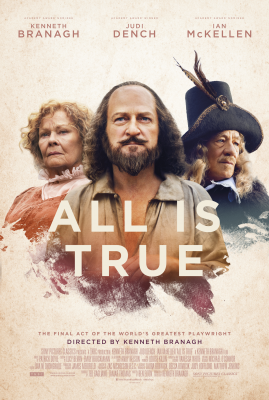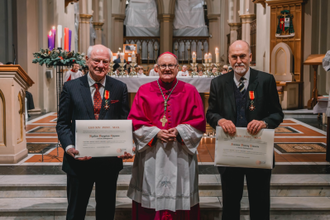Film: All is True

All is True was the subtitle for William Shakespeare's last play, Henry VIII, written in 1613. and performed at the Globe Theatre on London's Southbank. Shakespeare's theatre - burnt down when a props cannon shot set the building alight during performance.
Sir Kenneth Branagh's film of the same name in which he stars, takes this as it's starting point which saw the "greatest playwright of the age" return to his neglected family at Stratford upon Avon for the last three years of his life. In an enigmatic performance, Branagh ponders this retirement and his anxst at the loss of his son Hamnet when he was away in London years. He seems bewildered by his life and says at one point he is "empty of soul", seeking solace in gardening, creating a memorial garden for his lost son. The ghost of his child haunts him as he seeks to come to terms with his death. Later, he wistfuly admits to being a poor gardener. Ironically it is only part of the gardens that remain of his fine Stratford property, New Place, recreated here at Dorney Court, Windsor.
The cinematography by Zac Nicholson is breathtakingly beautiful. Panoramic views of the countryside glow with natural light. The interiors scenes are lit by candlelight, resembling a series of Rembrandt paintings by night and Vermeer by day. At times the film is very moving supported by a strong ensemble cast. Judy Dench is shrewd, astute and tender as Anne Hathaway, the Bard's long suffering wife, in a gem of a performance belying her years. In a cameo of great depth Ian McKellen is superb as the Earl of Southhampton, Shakespeare's longstanding patron and object of his deep seated admiration and love. Both theatrical knights create pure cinematic magic in reciting Sonnet 29, originally dedicated to Southampton, to each other.
The fractious relationship with his daughters is plausibly examined and gradually healed following local scandals, as is that with his wife in moments of tenderness. Throughout Branagh teases the onlooker with twinkling eyes as to what he really thinks There are veiled allusions to Shakespeare's beliefs. He mildly mocks his Puritan son -in -law and feels uncomfortable attending the town's Protestant church. His wife points out that it is not London and he cannot get away without paying a fine if he does not attend. He also refers to "this vale of tears", reminiscent of the Salve Regina.' Recent scholarship has suggested that Shakespeare was a closet Catholic and that his plays are full of Catholic references. Even the former Archbishop of Canterbury, Rowan Williams, and the Vatican's newspaper, L'Osservatore Romano, have said that he was "probably a Catholic".
It is known that Shakespeare purchased Blackfriars Gatehouse in 1613, near the Globe Theatre, an area of underground Catholic activity, and leased it. Reputedly it was a Catholic safe house.
In the film, The Earl of Southampton on his visit says: "there has always been a whiff of Popery about you Shakespeares."
Questioned about Shakespeare's beliefs in a Q&A session following a special screening, Branagh said he liked to be elusive about it, saying that the plays, especially Hamlet expounded on Catholic belief in the nature of life and death. He felt Shakespeare was searching for inner peace in his retirement.
Preparing for the role, Branagh closely studied the portrait of Shakespeare in the National Portrait Gallery noting that his eyes had a slight twinkle, conveying him as gentle yet elusive.
The screenplay by Ben Elton is gently witty but occasionally brings to mind Upstart Crow, the TV comedy about the Bard - especially with such lines as- "I never let the truth spoil a good story!"
Subtly invoking a stage finale, a dying Shakespeare is surrounded by his family in the garden who poignantly recite lines from 'Fear no more the heat of the sun….' from Cymbeline, a late play about a kings' difficult family relations with his daughter.
Not to be missed.


















